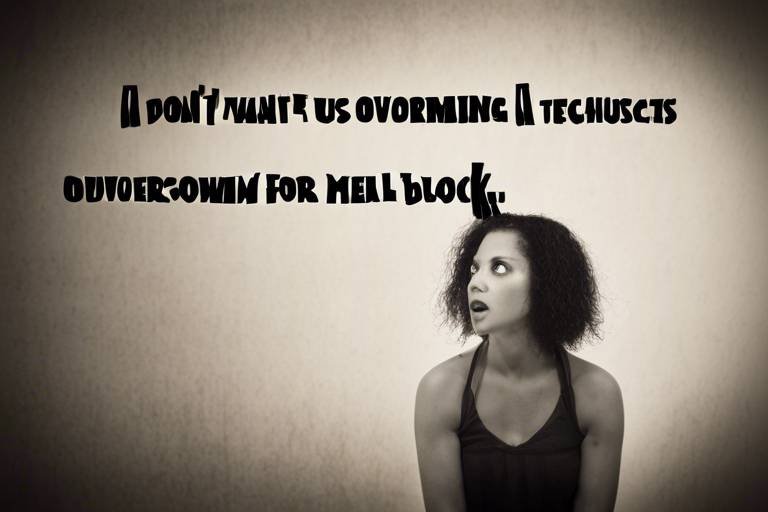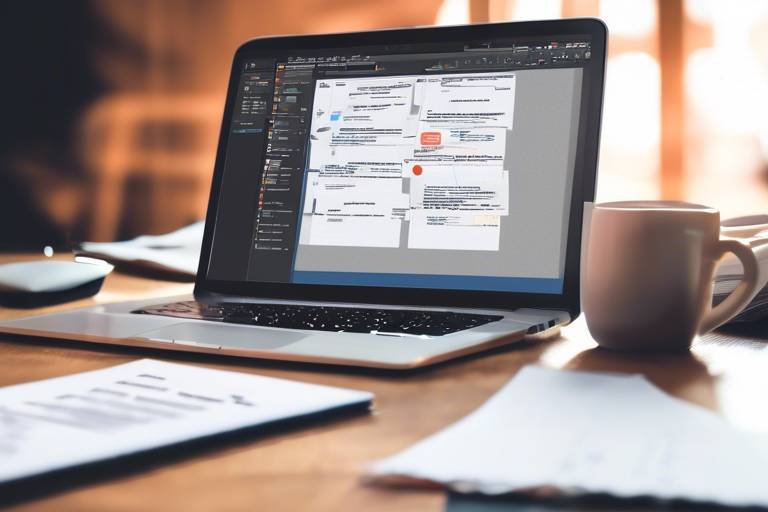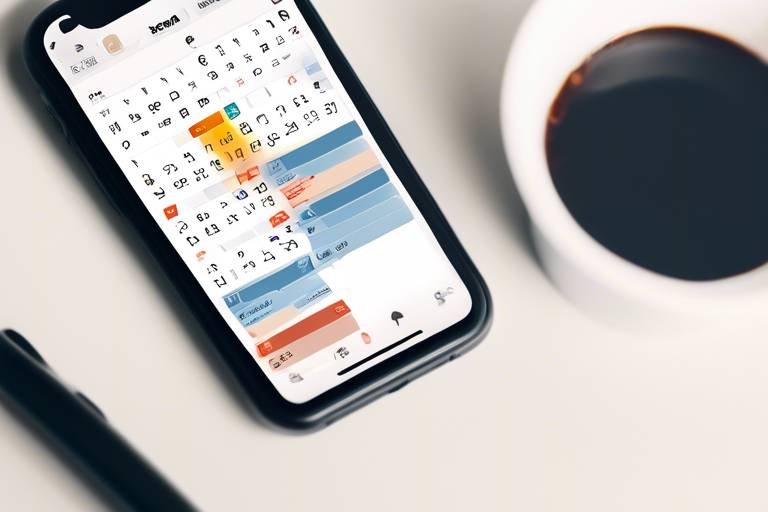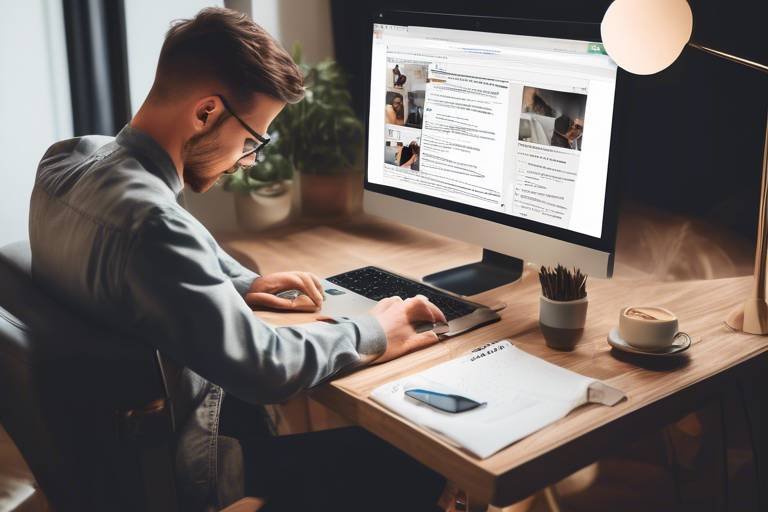Techniques for Overcoming Mental Blocks
When faced with mental blocks that impede creativity, productivity, and personal growth, it's essential to explore effective strategies to break through these barriers. These obstacles can manifest in various forms, hindering our progress and stifling our potential. By implementing specific techniques, individuals can navigate through these mental hurdles and unleash their full capabilities.
One approach to overcoming mental blocks is by identifying the root cause behind them. Understanding the underlying reasons for these obstacles and pinpointing specific triggers can provide valuable insights into how to address and overcome them effectively. By delving deep into the source of these mental barriers, individuals can develop targeted solutions to combat them.
Practicing mindfulness is another powerful technique for overcoming mental blocks. Cultivating awareness of one's thoughts and emotions allows individuals to navigate through these obstacles with clarity and focus. By staying present in the moment and acknowledging any mental barriers that arise, individuals can develop a proactive approach to overcoming them.
Setting achievable goals is crucial in preventing overwhelm and boosting motivation when facing mental blocks. By establishing realistic objectives, individuals can break down daunting tasks into manageable steps, making progress more attainable. Setting clear goals provides a roadmap for overcoming obstacles and staying on track towards personal growth.
Embracing failure as a learning opportunity is a mindset shift that can help individuals overcome mental blocks. By reframing setbacks as valuable lessons and opportunities for growth, individuals can foster resilience and a continuous improvement mindset. Viewing failure as a natural part of the learning process can reduce the fear associated with making mistakes.
Utilizing visualization techniques can also be effective in overcoming mental barriers. By harnessing the power of mental imagery, individuals can enhance their focus and motivation towards breaking through these obstacles. Visualizing success and envisioning oneself overcoming challenges can instill a sense of confidence and determination.
Engaging in physical exercise is another strategy for overcoming mental blocks. Physical activity has been shown to positively impact mental clarity, creativity, and overall well-being. Exercise can help individuals release stress, boost endorphins, and improve cognitive function, making it easier to overcome mental hurdles.
The importance of seeking support from others should not be underestimated when facing mental blocks. Seeking guidance and encouragement from peers, mentors, or professionals can provide valuable perspectives and insights. Connecting with others who understand the challenges of overcoming mental barriers can offer encouragement and motivation.
Exploring creative outlets can stimulate the mind and break through mental barriers. Engaging in activities such as art, music, writing, or other creative pursuits can inspire new ideas, perspectives, and solutions. Creative expression can unlock hidden potential and provide a refreshing outlet for overcoming mental blocks.

Identifying the Root Cause
Exploring strategies to break through mental barriers hindering creativity, productivity, and personal growth.
Understanding the root cause of mental blocks is crucial in overcoming them effectively. By delving deep into your thoughts and emotions, you can pinpoint specific triggers that lead to these barriers. It's like being a detective investigating a mystery within your own mind. Through introspection and reflection, you can uncover the underlying reasons behind your mental blocks, whether they stem from past experiences, fears, or self-doubt.

Practicing Mindfulness
Mindfulness is a powerful practice that involves being fully present and aware of one's thoughts, emotions, and surroundings. By cultivating mindfulness, individuals can effectively navigate through mental obstacles and enhance their overall well-being. One technique to practice mindfulness is through meditation, where individuals focus on their breath or a specific sensation to anchor themselves in the present moment. This practice helps in quieting the mind and reducing the impact of distractions that contribute to mental blocks.
Another way to incorporate mindfulness into daily life is through mindful activities such as walking, eating, or even washing dishes. By paying close attention to each movement and sensation, individuals can develop a heightened sense of awareness that can aid in breaking through mental barriers. Mindfulness also involves acknowledging and accepting one's thoughts and feelings without judgment, allowing for a more compassionate and understanding approach towards oneself.
Moreover, practicing mindfulness can help individuals recognize recurring patterns of negative thinking or self-doubt that contribute to mental blocks. By becoming aware of these patterns, individuals can take proactive steps to challenge and reframe them, leading to a more positive and constructive mindset. Mindfulness encourages individuals to observe their thoughts from a distance, creating space for clarity and insight to emerge.
Additionally, incorporating mindfulness techniques into daily routines can improve focus, concentration, and overall mental clarity. By being fully present in the moment, individuals can better engage with tasks at hand and avoid being overwhelmed by distractions or intrusive thoughts. This heightened state of awareness allows for a deeper connection with one's inner thoughts and emotions, facilitating the process of overcoming mental blocks.

Setting Achievable Goals
When it comes to overcoming mental blocks, one crucial technique is setting achievable goals. By establishing realistic objectives, individuals can prevent feeling overwhelmed and boost their motivation to tackle mental barriers effectively. Setting achievable goals provides a clear roadmap for progress, breaking down larger tasks into smaller, manageable steps.
Imagine trying to climb a mountain without any markers or checkpoints along the way. It would be daunting and challenging to stay motivated. Similarly, setting achievable goals acts as milestones on the journey to overcoming mental blocks, providing a sense of accomplishment with each step forward.
Moreover, realistic goals help individuals maintain focus and direction, preventing distractions and procrastination that can exacerbate mental barriers. By breaking down larger objectives into smaller, actionable tasks, individuals can make steady progress and build momentum towards overcoming their mental blocks.
Setting achievable goals is not about aiming low but rather about setting targets that are challenging yet within reach. This approach fosters a sense of accomplishment and boosts confidence, reinforcing the belief that overcoming mental blocks is possible with dedication and perseverance.

Embracing Failure as a Learning Opportunity
Failure is often viewed negatively, but it can actually serve as a valuable teacher in our journey towards success. When we embrace failure as a learning opportunity, we shift our mindset from one of defeat to one of growth and resilience. Just like a phoenix rising from its ashes, we can emerge stronger and wiser from our setbacks.
By analyzing our failures, we can uncover valuable insights that can guide us towards better decisions in the future. Each misstep is a chance to learn, adapt, and improve. It's like a sculptor chiseling away at a block of marble to reveal a masterpiece - failure shapes us into better versions of ourselves.
Moreover, embracing failure allows us to develop a growth mindset, where challenges are seen as opportunities for development rather than threats to our self-worth. It's akin to a gardener nurturing a delicate seedling, knowing that with care and attention, it will blossom into a beautiful flower.
Failure is not the end of the road but a bend that leads us in a new direction. It teaches us resilience, perseverance, and the courage to try again. Just like a surfer riding the waves, each fall is a chance to get back up and ride even higher. Embracing failure as a learning opportunity is not just about bouncing back; it's about bouncing forward with newfound strength and wisdom.

Utilizing Visualization Techniques
Visualization techniques are powerful tools that can help individuals overcome mental blocks by harnessing the imagination to create positive outcomes. By vividly picturing desired goals or scenarios in the mind, one can enhance focus, motivation, and confidence in achieving success. Visualization involves creating detailed mental images of specific situations or achievements, engaging all senses to make the experience as real as possible.
When utilizing visualization techniques, it is essential to find a quiet and comfortable space to relax and concentrate. Close your eyes and immerse yourself in the visualized scenario, paying attention to the emotions and sensations that arise. By repeatedly visualizing success and positive outcomes, individuals can rewire their brains to believe in their capabilities and overcome self-imposed limitations.
Moreover, visualization can be combined with affirmations or positive self-talk to reinforce the desired mental state. By incorporating affirmations that align with the visualized goals, individuals can further enhance the effectiveness of this technique. Visualization serves as a powerful tool to program the subconscious mind for success and build the confidence needed to tackle challenges and mental blocks.

Engaging in Physical Exercise
Engaging in physical exercise is a powerful tool to overcome mental blocks and enhance overall well-being. When we engage in physical activity, our bodies release endorphins, often referred to as the "feel-good" hormones. These endorphins can help reduce stress and anxiety, which are common culprits of mental barriers. Additionally, exercise promotes increased blood flow to the brain, leading to improved cognitive function and mental clarity.
Moreover, physical exercise provides a break from the mental strain of facing creative or productivity challenges. It allows the mind to rest and rejuvenate, offering a fresh perspective when returning to the task at hand. Just like how a muscle needs recovery time after a workout to grow stronger, our minds benefit from the break provided by physical activity to overcome mental blocks.
Think of physical exercise as a reset button for your brain. It helps you break free from the cycle of negative thoughts and self-doubt that often accompany mental blocks. By engaging in activities like running, yoga, or even a brisk walk, you can boost your mood, increase energy levels, and sharpen your focus.
For those struggling with mental blocks, incorporating regular physical exercise into your routine can be a game-changer. It not only improves your physical health but also has a profound impact on your mental well-being. So, next time you find yourself stuck in a creative rut or facing productivity challenges, lace up your shoes and get moving to break through those mental barriers.

Seeking Support from Others
Exploring strategies to break through mental barriers hindering creativity, productivity, and personal growth.
When facing mental blocks, seeking support from others can be a game-changer. It's essential to remember that you don't have to navigate through challenges alone. Surrounding yourself with a supportive network of friends, family, or professionals can provide a fresh perspective, valuable insights, and encouragement to help you overcome mental hurdles.
Sharing your struggles with someone you trust can lighten the burden and offer a different viewpoint on the situation. Sometimes, simply talking about your challenges out loud can lead to new ideas or solutions that you may not have considered on your own.
Moreover, seeking support from others can boost your morale and motivation. Knowing that you have a support system cheering you on can increase your confidence and belief in your ability to overcome obstacles. Whether it's through words of encouragement, practical advice, or shared experiences, the support of others can fuel your determination to push past mental blocks.
Additionally, collaborating with others on projects or brainstorming sessions can spark creativity and innovation. Different perspectives and diverse ideas brought by team members can help you break free from stagnant thinking patterns and inspire fresh approaches to problem-solving.
Remember, seeking support is not a sign of weakness but a demonstration of strength and willingness to grow. Embracing the help of others can lead to breakthroughs and new opportunities that may have been otherwise overlooked.

Exploring Creative Outlets
When it comes to overcoming mental blocks, exploring creative outlets can be a powerful tool to stimulate the mind and break through barriers. Engaging in creative activities not only provides a refreshing break from routine tasks but also allows for new perspectives and ideas to emerge.
One way to explore creative outlets is through artistic endeavors such as painting, drawing, or sculpting. These activities encourage self-expression and can help in processing emotions and thoughts that may be contributing to mental blocks. Additionally, immersing oneself in the creative process can promote a sense of flow and focus, leading to a clearer mind.
Another avenue for exploring creative outlets is through writing, whether it be journaling, poetry, or storytelling. Writing can be a cathartic experience, allowing for the release of pent-up feelings and providing a channel for self-reflection. Moreover, putting thoughts into words can help in organizing ideas and gaining clarity on complex issues.
Music and dance are also excellent creative outlets that can uplift the spirit and energize the mind. Engaging in rhythmic movements or listening to melodious tunes can have a profound impact on mood and creativity. These activities offer a unique way to express oneself and break free from mental constraints.
Furthermore, exploring nature and the outdoors can serve as a creative outlet by providing inspiration and a change of scenery. Spending time in natural settings can rejuvenate the mind and spark new ideas, offering a fresh perspective on challenges and obstacles. Connecting with the natural world can be a source of solace and creativity.
Incorporating diverse creative outlets into daily life can help in maintaining mental agility and resilience. By embracing different forms of expression and exploration, individuals can nurture their creativity, overcome mental blocks, and unleash their full potential.
Frequently Asked Questions
- What are mental blocks?
Mental blocks refer to obstacles that hinder one's ability to think creatively, solve problems, or make progress towards their goals. These blocks can manifest as self-doubt, fear of failure, lack of motivation, or difficulty focusing.
- How can I identify if I am experiencing a mental block?
Signs of a mental block may include feeling stuck, constantly procrastinating, experiencing heightened stress or anxiety, or being unable to generate new ideas. Recognizing these patterns can help you address and overcome the block.
- What role does mindfulness play in overcoming mental blocks?
Mindfulness involves being present in the moment without judgment, which can help you observe your thoughts and emotions objectively. By practicing mindfulness, you can gain clarity, reduce mental clutter, and better navigate through obstacles.
- How can seeking support from others help in overcoming mental blocks?
Seeking support from friends, mentors, or mental health professionals can provide different perspectives, encouragement, and guidance in overcoming mental blocks. Sharing your challenges with others can offer new insights and strategies for moving forward.
- Why is embracing failure important in breaking through mental barriers?
Embracing failure as a learning opportunity can help shift your mindset from fear of making mistakes to seeing setbacks as stepping stones to growth. By reframing failure as a natural part of the learning process, you can cultivate resilience and persistence in overcoming mental blocks.



















